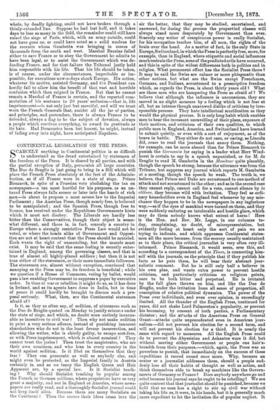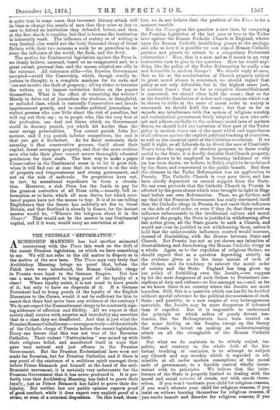CONTINENTAL LEGISLATION ON THE PRESS.
SCARCELY anything in Continental politics is so difficult to understand as the dread entertained by statesmen of -the freedom of the Press. It is shared by all parties, and with the partial exception of Italy, permeates all large countries. The Due de Broglie is just going to bring in a Bill which will place the French Press absolutely at the feet of the Adminis- tration, as if all France were in a state of siege. Prince Bismarck, in spite of a Prussian vote abolishing the tax on newspapers—a tax most hurtful for his purposes, as an un- taxed Press always falls sooner or later into the hands of rich men—is about to propose a most severe law to the Imperial Parliament ; the Austrian Press, though nearly free, is believed to be manipulated ; and the Spanish Press, though free to licence, has received under the Republican Governments hints which it must not disobey. The Liberals are hardly less bitter than the Conservatives, though their object is some- what different, and there is, in fact, scarcely a country in Europe where a strongly restrictive Press Law would not be voted, or where the heads alike of Government and Opposi- tion are not at heart content that the Press should be muzzled. Each wants the right of unmuzzling, but the muzzle must exist. It may be said that the same feeling is secretly enter- tained in England, among the governing classes, and that is true of almost all highly-placed soldiers ; but then it is not true either of the statesmen, or their more immediate followers. The statesmen are, almost without exception, convinced that annoying as the Press may be, its freedom is beneficial ; while we question if a House of Commons, voting by ballot, would pass alaw enabling Government to suppress a paper by executive order. In time of war or rebellion it might do so, as it has done in Ireland, and as its agents have done in India, but in time of peace it could hardly be brought to discuss such a pro- posal seriously. What, then, are the Continental statesmen afraid of?
Is it, as they so often say, of sedition, of utterances such as the Duo de Broglie quoted on Monday to justify seizurc s under the state of siege, and which, no doubt were entirely inexcus- able as incentives to civil war? Then why not make sedition in print a very serious offence, instead of punishing innocent shareholders who do not in the least favour insurrection, and allowing the writer, who is chiefly guilty, to escape scot-free, or with Press imprisonment, which is almost nominal ? They cannot trust the juries ? Then trust the magistrates, who are their own nominees, and who lean in every country in the world against sedition. Is it libel on themselves that they fear ? They can prosecute as well as anybody else, and. might even be protected, as the Imperial family in Austria certainly is, and as we fancy the English Queen and Heir Apparent are, by a special law. Is it Socialist teach- ing? Why should Socialist teaching be popular among the French or German millions, where proprietors have so very great a majority, and not in England or America, where news- papers are really read, and a thoroughly Socialist journal could not keep itself alive. Because there are many Socialists on the Continent ? Then the sooner their ideas come into the air the better, that they may be studied, ascertained, and answered, for daring the process the propertied clams will always stand more desperately by Government than ever. Scarcely any writer of conspicuous power is really Socialist, for his occupation teaches him, of all men, the rights of the brain over the hand. As a matter of fact, in the only State in Europe, Switzerland, in which the Press is perfectly free, more, for example, than in England, where etiquette and social influences muchrestrain the Press, none of the predicted evils have occurred, and this in spite of the widest differences both in politics and in religion. What permanent effect has the Socialist Press there ? It may be said the Swiss are calmer or more phlegmatic than other nations, but what are the Swiss except Frenchmen, Germans, and Italians, accustomed to a prescriptive freedom which, as regards the Press, is about thirty years old? 'What are these men who are hampering the Press so afraid of ? We believe that although the influence is unconscious, they are moved in no slight measure by a feeling which is not fear at all, but an intense though unavowed dislike of criticism by irre- sponsible persons. They hate intellectual scarification as they would the physical process. It is only long habit which enables men to bear the incessant unravelling of their plans, exposure of their motives, and criticism of their own qualities, to which public men in England, America, and Switzerland have learned to submit quietly, or even with a sort of enjoyment, as of the brave in battle. They either do not care, or caring, as Lincoln did, cease to read the journals that annoy them. Nothing, for example, can be more absurd than for Prince Bismarck to punish the Germania for saying in a leader what Herr Wind- horst is certain to say in a speech unpunished, or for M. de Broglie to read M. Gambetta in the Moniteur quite placably, though the speech be strong, because the utterance was from the Tribune, but suppress any journal which reports M. Gambetta at a meeting, though the speech be weak. The truth is, we believe, that Prince and Duke are accustomed to one method of attack and not accustomed to the other; and as in the second case they cannot reply, cannot call for a vote, cannot silence by /a cloture, they become wild with irritation. They feel as ordi- nary householders even in England feel whenever by any mis- chance they happen to be in the newspapers in any inglorious way,—as if the eyes of mankind were turned on them, and they were suddenly enduring an intolerable and hostile glare, which may do them nobody knows what extent of harm! Here is the Hon. and Rev. Mr. Legge, in our columns to- day, complaining, no doubt, of misrepresentation, but evidently feeling at heart only the sort of pain we are trying to indicate, and which oppresses Continental states- men all the more because, from the secrecy usually maintained as to their plans, the critical journalist is very often very ill- informed. Prince Bismarck, it would seem, sees this, and according to a correspondent of the Times, is connecting him- self with the journals, on the principle that if they publish his facts as he puts them, he will bear their abstract jour- nalistic comment. But he is still only half a believer in his own plan, and wants extra power to prevent hostile criticism, and particularly criticism on religious points, sure to be both bitter and perpetual. He is irritated by the fall glare thrown on him, and like the Duo de Broglie, under the irritation loses all sense of proportion, all conception of relative political dynamics. The power of the Press over individuals, and even over opinion, is exceedingly limited. All the thunder of the English Press, Continued for years, did not shake Lord Palmerston's popularity, or prevent hie becoming, by consent of both parties, a Parliamentary dictator ; and the attacks of the American Press on General Grant—attacks quite unprecedented even in American jour- nalism—did not prevent his election for a second term, and will not prevent his election for a third. It is nearly the same with regard to measures. All the English Press could do to prevent the Abyssinian and Ashantee wars it did, but without moving either Government or people one hair's- breadth from their purposes,—which, again, the Press was so powerless to punish, that immediately on the success of these expeditions it veered round once more. Why, because an orator or a journalist addresses them, should a people sud- denly lose all their habits of thought as well as action, and think themselves able to break up machines like the Govern- ments of Germany or Prance? Does anybody anywhere go and rebel because his journal says he ought to be rebelling? We are quite content that that journalist should be punished, because we hold that no man has a right to stir up civil war without taking his life as, it were, in his hands, but it is generally much more expedient to let the invitation die of popular neglect. It is quite true in some cases that incessant literary attack will in time so change the moods of men that they cease at last to care to defend an institution they defended before, and then at the first shock it tumbles, but that is because the institution is inherently weak, The influence of oratory or of writing is very limited, else would not the forty thousand clergy of Great Britain with their two sermons a week be so powerless to de- stroy the influence of the world, the flesh, and the devil.
The motive for Continental legislation against the Press is, we firmly believe, unsound, based on an exaggerated and, to a great extent, personal fear, and the means adopted are silly in the extreme. All statesmen alike—the Russian Government excepted—avoid the Censorship, which, though cruelly in- jurious to thought, is a complete machine for its ends, and '...nes not involve the theft of property ; all try either to terrorise the writers, or to impose restrictive duties on the papers themselves. What is the effect of terrorizing the writers ? Merely to drive. out of journalism the studious, or thoughtful, or secluded class, which is naturally Conservative and dreads imprisonment greatly, and to confine political journalism to violent persons who care little about the risk of penalties, but will say out their say ; or to people who, like the very best of the profession, can deal out blows which no Government could in decency punish, yet which hit harder than the
most savage personalities. You cannot punish John Le- moinne, and if you punish inferior competitors, the end is that you get a Rochefort. As for fiscal restraints, their meaning is that conservative persons, timid about their capital, dread newspaper property, and that the more reckless men who take their place cannot secure thoroughly educated gentlemen for their staffs. The best way to make a paper Conservative in the Continental sense is to let it grow rich, when it will find out at once that its interest is on the side of* property and temperateness and strong government, and not on the side of mob-rule. Its proprietors have not, in fact, by sensational expedients to force a circula- tion. Moreover, a rich Press has the funds to pay for the greatest corrective of all Press evila,—namely, full in- formation as to facts, which all men desire, but which over- taxed papers have not the means to buy. It is of no use telling Englishmen that the Queen has suddenly set fire to Great Britain, and that Scotland is already in flames, for the instant answer would be, "Where's the telegram about it in the Times?" That would not be the answer in any Continental capital, and if it were, would carry no conviction at all.











































 Previous page
Previous page